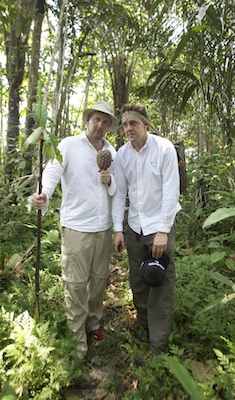__________________________________________
PEOPLE OFTEN TALKED about where Alex Kratena and Simone Caporale would end up after Artesian. No one said the Amazon. Yet, pineapple in hand, weaved basket as bandana, the poster boys of five-star hotel bartending have just returned from the Peruvian jungle.
What were they doing in the jungle, you might ask, as I did of Kratena back in the cosy surrounds of a London tapas bar. “We [partners Monica Berg and Melissa Zelaya also attended] were curious about what could be done with Amazon produce. It’s ridiculous to say we were foraging in the Amazon but that’s what we did.”
The expedition was in tandem with the ‘jungle chef’ Pedro Miguel Schiaffino from Malabar, the famed Lima restaurant that showcases Amazonian ingredients.
The aim of the adventure: to uncover flavours and ingredients not known to wider society and trial them in cocktails once back in Peru’s capital.
First they flew to Iquitos, a river island boomtown of the rubber industry that over the years fizzled out, and last stop before the largest rainforest on Earth. “It looked like Oporto but with wrecked ships on the banks of the river and old grand hotels taken over by local military. In Iquitos you do not know what is going to happen next,” says Kratena.
Iquitos is also home to one of the craziest markets in the world – a trading hub for the Amazon basin’s most exotic specimens. “It had wild fruit, alligator and turtle meat, prehistoric-looking fish… you can even buy piranhas,” says Kratena.
But markets don’t quite pass as jungle foraging. Kratena and co took a speedboat – in these parts something that floats with an engine on the back of it – and took to the great river.
So what’s the Amazon like? “It’s fucking huge and very muddy.” It’s also the only place to take a bath. “The first day, there was no way we were jumping in the river. By day three in the heat, we all went in. The Amazon is everything – the toilet, the bathroom… and it has piranhas. But they were the vegetarian sort.”
From the Langham to the Amazon – how were the rooms? “We stayed with an indigenous tribe in homes on stilts. We learned from them – all their ancient techniques…” The food? “The strange thing is there are many things growing in the jungle – citrus everywhere – but the local people do not eat them. It seemed only yucca, fish, beans and fermented pineapple.”
Pineapple is one ingredient Kratena is synonymous with (if you can be synonymous with a pineapple), ever since Artesian popularised his brass pineapple cocktail. But Kratena was in for a shock. “To think to this year, aged 34, I had never tasted a real pineapple. What we have [outside of the Amazon] is a crossbreed of the indigenous pineapple, which has white flesh and tastes somewhere between a pear and a coconut.”
Though the party returned to Lima like benevolent Victorian explorers, with cases full of never-seen-before bounty, it’s unlikely many of these rare samples will ever see the bright lights of beyond. “A lot of the produce is so fragile it didn’t even travel to Lima,” says Kratena.
Indeed, the real spoils were the experiences. Finding an aguardente producer, originally from Andalucía, distilling deep in the jungle and creating an Amazon Amaro, picking leaves that taste like oregano and learning how to make bread out of yucca.
They will return. Not necessarily in person, but they aim to support the local communities’ enterprises through their own. When Kratena says this, it is not an empty promise.
“Every day we think about what happened in the jungle,” he says.



